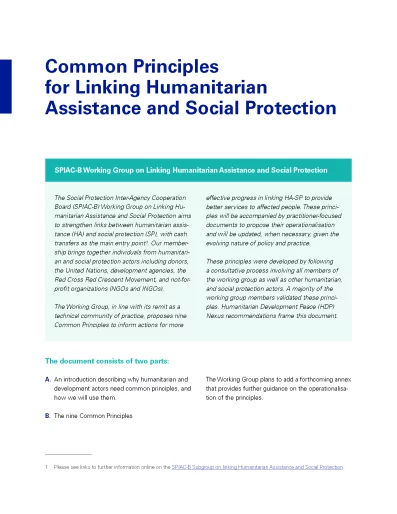Common Principles for Linking Humanitarian Assistance and Social Protection
The Social Protection Inter-Agency Cooperation Board (SPIAC-B) Working Group on Linking Humanitarian Assistance and Social Protection aims to strengthen links between humanitarian assistance (HA) and social protection (SP), with cash transfers as the main entry point. Our membership brings together individuals from humanitarian and social protection actors including donors, the United Nations, development agencies, the Red Cross Red Crescent Movement, and not-for-profit organizations (NGOs and INGOs).
The Working Group, in line with its remit as a technical community of practice, proposes nine Common Principles to inform actions for more effective progress in linking HA-SP to provide better services to affected people. These principles will be accompanied by practitioner-focused documents to propose their operationalisation and will be updated, when necessary, given the evolving nature of policy and practice.
These principles were developed by following a consultative process involving all members of the working group as well as other humanitarian, and social protection actors. A majority of the working group members validated these principles. Humanitarian Development Peace (HDP) Nexus recommendations frame this document.
The nine principles are:
IN ALL CRISIS SETTINGS:
1. Systematically assess entry points for linking HA-SP when designing and implementing emergency response plans.
2. Ensure the meaningful and safe inclusion of vulnerable populations.
3. Ensure engagement with local actors when linking HA-SP, taking into consideration the space in the country for civil society engagement.
4. Elaborate more flexible financing mechanisms to enable social protection approaches ‘across the nexus’.
5. Build coordination mechanisms that link HA-SP at country, regional and global levels.
6. Work towards joint monitoring and evaluation frameworks to measure results and build the evidence base for what does and does not work.
IN MORE STABLE CONTEXTS WITH RECURRING (PREDICTABLE CLIMATE) SHOCKS:
7. Make coordinated and complementary contributions to social protection system strengthening, guided by jointly defined plans, while retaining humanitarian space.
IN FRAGILE AND COMPLEX SETTINGS, INCLUDING CONFLICT:
8. Seek entry points to preserve elements of social protection or build the foundations of safety nets in conflict settings, when appropriate, based on strong conflict sensitivity, do no harm, protection risk, and other risk analysis.
COUNTRIES HOSTING FORCIBLY DISPLACED POPULATIONS AND MIGRANTS:
9. Expand access to social protection for forcibly displaced populations and migrants.



